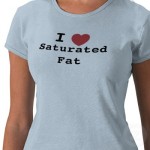The misconceptions and outright lies about saturated fat and your health.
Hi Welcome Back!!
As you know I believe that there is a mountain of evidence (growing larger daily) that shows that processed carbs are the underlying cause of obesity and that a simple way to drop body fat and shift your shape is to cut them out of your diet.
A few people have written in and asked ‘What about saturated fat? Doesn’t it cause hear t attacks and obesity?’
Here is the first of several posts on the truth about saturated fat. What I have to tell you will surprise you. It may even make you angry.
For decades we’ve been told that saturated fat will clog up our arteries and kill us. Most health professionals will tell you that fat is bad for you, that it raises the bad cholesterol (LDL), causes obesity and is a major contributing factor to heart disease & stroke. The media also pushes this line and rolls out dietician and nutritionist one after the other who agree.
The trouble is that no-one has ever proved it.
You read that right – NO-ONE HAS EVER PROVED IT!
What has become Politically Correct Nutrition is based on the assumption that we should reduce our intake of fats, particularly saturated fats from animal sources. Fats from animal sources also contain cholesterol, which is presented as the other main cause of heart disease and is seen as an evil part of the a ‘civilized’ diet.
I’m here to tell you that this is a false perception. And a deadly one.
Simply put saturated fat is a normal, natural part of the human diet and has been literally from the time the first Neanderthal took a bite of animal…
Fats are essential to our health – without them you would sicken & die.
Why?
Well fats from animal and vegetable sources:
• Act as a concentrated source of energy in the diet;
• They provide essential parts of the building blocks for cell membranes
• They provide a wide variety of hormones and hormone-like substances.
• They act as carries for all of the fat soluble vitamins like A, D, E,& K
• They assist with mineral absorption
• They are an essential part of the processes involved in converting carotenes into Vitamin A
• Fats slow down absorption of food if part of a meal so it takes longer for us to feel hunger again.
• Fats are a part of what keeps our skin in condition
• Fats are involved in…
You get the picture – fats are essential to our health.
The cause of this demonization of saturated fats is a thing called the ‘Lipid Hypothesis’. (fat theory).
Now according to this fat theory there is a direct relationship between the amount of saturated fat and cholesterol in someone’s diet and their incidence of coronary heart disease. This was proposed by a medical researcher in the 1953 whose name was Ancel Keys who believed that there was a connection between fat intake and mortality from heart attacks in 6 countries: Japan, Italy, England, Australia, Canada, and the USA.
What he reported was that the US had the highest heart attack rate and the highest fat intake whilst Japan had the lowest fat intake and the lowest rate of heart attacks. The other countries neatly fitted into the 2 extremes, again based on reported fat intake and heart attack incidence. Keys called this a ‘remarkable’ relationship and went public with the idea that eating fat causes heart attacks. He was quite a natural publicist and was soon on the cover of TIME gravely warning that people were ‘eating themselves to death’.
In 1970 he then said that new research had shown that it was not all fat, but rather the amount of animal fat eaten could be used as an accurate predictor of someone’s likelihood of suffering a heart attack. He also noted that there was a strong link between cholesterol and heart disease. His hypothesis was that the saturated fat derived from animals raised cholesterol and this lead to heart disease. Most Doctors and even the Heart Foundation believe this to this day – 40 years after the theory was proposed.
Thing is there are major flaws & problems with Keys & his research.
In numerous subsequent studies over the last 40 years his data and conclusions have been brought into question. For example the data he used to draw his conclusions came from only six countries – which represent only a small portion of the countries where data was available on fat consumption versus heart disease death rate.
When subsequent researches have gone back and used data from the same era, but from a greater range of countries, even with a bias towards the ‘western diet;’ they found that there was no link between fat consumption and heart disease deaths.
Read that again – NO LINK!!
So Keys’ conclusions were actually false.
Next is the fact that even in the 1950’s it was recognised that there were a number of factors that caused heart disease but Keys chose to consider only one potential factor – fat intake. He gave no consideration of other factors such as smoking rates, stress factors, sugar intake, exercise frequency etc etc.
It is unfortunate that his faulty research was coupled with a flair for promotion and the beginnings of the food processing industry because this confluence of factors has seen Keys study cited for over 5 decades as proof of the “fact” that saturated fat is bad for you.
There ain’t much in the way of facts here…
Since that time, numerous other studies have been conducted trying to link saturated fat intake to heart disease. The majority of these studies have failed to correlate ANY risk at all from saturated fat. A couple of them made feeble attempts at linking saturated fat to heart disease, however, it was later shown that in those studies, the data was flawed as well.
I’ll be back with the Whys & Wherefores of the good things about saturated fats and how eating them can actually be better than good for your health…
I’d love to hear from you – so Tweet this, Face Book like this or leave a comment!





